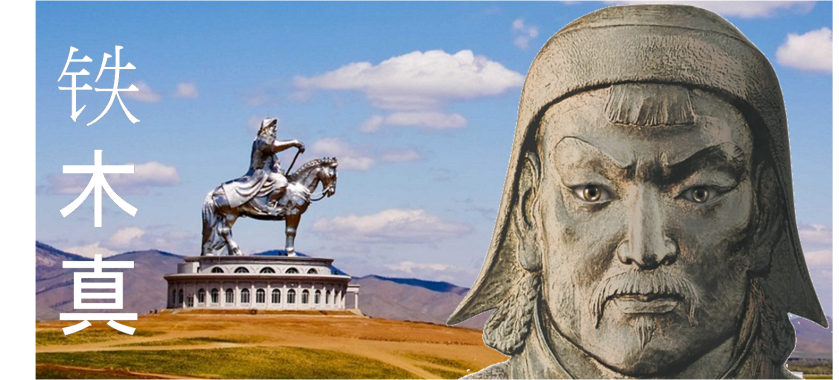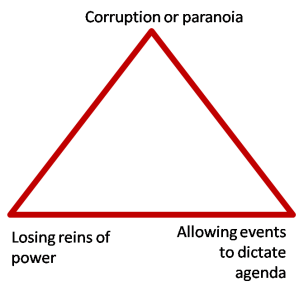 The empire that this man founded became the largest contiguous empire in history, after his demise. His empire, which extended from China to Afghanistan to Hungary, was about 12 million sq. miles in area. Among his other achievements was also bringing the the silk route under one cohesive political environment. Born Temujin around 1162 and about 0.5% of the world’s male population carries his DNA. There clearly was something about this man, though most of us prefer to hate him. Peeling the wraps does exhibit some qualities which might have made him the man he was. Let us examine the 10 basic principles1 of leadership that he exhibited.
The empire that this man founded became the largest contiguous empire in history, after his demise. His empire, which extended from China to Afghanistan to Hungary, was about 12 million sq. miles in area. Among his other achievements was also bringing the the silk route under one cohesive political environment. Born Temujin around 1162 and about 0.5% of the world’s male population carries his DNA. There clearly was something about this man, though most of us prefer to hate him. Peeling the wraps does exhibit some qualities which might have made him the man he was. Let us examine the 10 basic principles1 of leadership that he exhibited.
 The foundation of his principles rested on the trivariate that Genghis worked with. He ran his conquests, his kingdom and life by creating a delicate balance between the constant pulls of corruption or paranoia, the probability of losing reins of power and allowing events to dictate his agenda. This maintenance of equilibrium in a way shaped him to be the leader that he evolved to be.
The foundation of his principles rested on the trivariate that Genghis worked with. He ran his conquests, his kingdom and life by creating a delicate balance between the constant pulls of corruption or paranoia, the probability of losing reins of power and allowing events to dictate his agenda. This maintenance of equilibrium in a way shaped him to be the leader that he evolved to be.
1. Reward Loyalty
Genghis remembered generous acts of people that he interacted with. He honoured the brave and loyal, regardless of their status. Once convinced of a person’s loyalty, he delegated large responsibilities.
This perhaps is an easy one. A leader in the modern age (like any other time) needs to be able to reward loyalty. But, as important is locating people who will be are willing to be loyal. These people could easily be part of an inner team or be spread out across your larger team or enterprise. These are people who will pick up your burden and also make you look good.
2. Be austere
He despised luxury, and honoured simplicity. People say that he would give the shirt off his back to a Mongol in need.
There are many examples of people who espouse simplicity; The Mahatma, Steve Jobs and Warren Buffet are rather famous examples. In modern times, it is less about wealth or luxuries, but more about simplicity of living as such.
3. Exercise self control
Of his many extraordinary qualities was the fact that he used to seldom lose his temper and also did allow others their say.
In our times, and always moderation and self control are ideals to be cherished. Krishna, or the Mahatma would be two examples to espouse. Calmness of the mind, obviously is helpful and many leaders get to that state either with meditation or picking up a stress buster set of regular exercises.
4. Find talent where you can, and use it
Under his reign, enemies became officers in his administration or army; herdsmen rose to be generals too. There were many non-Mongols who served under him
This is interesting. People usually gravitate towards people who are loyal (or seemingly so) to promote or elevate. But leaders do, and should pick their team members from competition, from inside their own teams and also from completely different industries. People with intelligence and talent are able to easily jump the chasm formed by difference in domains.
5. Kill enemies without compunction
He never forgot a favour, but also never forgave an insult. He was merciless, once convinced of disloyalty.
This sounds more politics related and is. No enterprise or company of some size is bereft of some manipulation, games and politics. It is only silly not to play these games once you are in the middle of them. A large part of the learning is to nullify obstacles ; that is people (inside or outside your organization) or organizations who work against your goal.
6. Oppose cruelty
Though he did order mass killings of those who opposed or insulted him, no one ever accused him of cruelty.
This perhaps would get interpreted somewhat in a different context. Arrogance while on the ascent is a negative virtue to carry.
7. Adapt, and be open to new ways of ruling
Though totally illiterate, over time he evolved and learned from many of the vanquished. An example would be getting record keeping done, and starting to put processes in his administration. This evolution happened as his kingdom grew in size.
Simply about nimbleness and agility in times of change. Whether one is able to adapt to change and modify one’s thoughts and ways of working. Or even how ready one is to appreciate and go with new paradigms. What does not matter is in-depth knowledge of the agencies of change, right up front.
8. Know that you have divine backing
Foreign rulers just had to acknowledge and understand this “truth” and all would be well for them.
Lets modify this to have a sponsor backing. It does not matter whether one is at the helm of an organization or leading a group of just two people; it does not matter whether you are working for someone else or yourself. You need to have a sponsor. Many a times you will need to use derived authority to push your ideas and actions through.
9. Make your followers and heirs believe it too
His followers acknowledged the heavenly diktat and saw success along with the Khan.
A large part of the concept of derived authority is to ensure that teams and other people who surround you accept the sponsor as a higher authority.
10. Respect freedom of belief
He was known to listen to advice, and also to all those who acknowledged the divine backing.
This principle perhaps has more to do with
- Respecting an individual
- And being open to thoughts other than one’s own.
This would require the leader to have an open mind and allow others to challenge a thought.
1. The principles are picked from John Man’s book – Genghis Khan, Life Death and Resurrection. However, the interpretation is ours. You may find similar other leadership principles described in Jack Weatherford’s biography of Genghis Khan.
